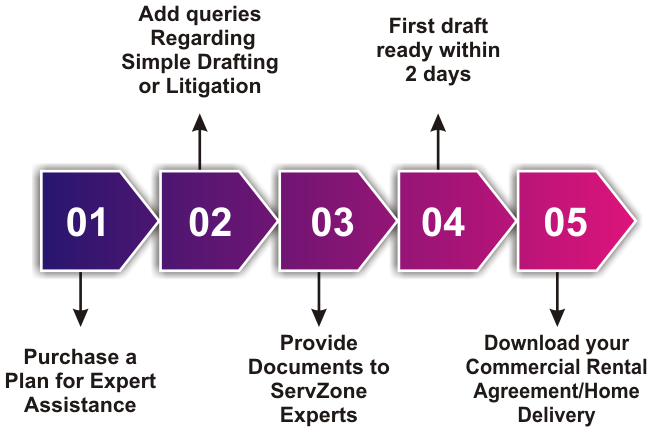Get Started With
servzone
A commercial rental agreement is a recognized document for renting a commercial property between a landlord and a tenant. The agreement allows both parties to formalize the rent and their relationship if the tenant plans to execute a business on the landlord's premises through a legally documented agreement.
A commercial rental agreement assumes that the property is being used for commercial purposes, not like a residential rental agreement. This assumes that it is not intended for residential purposes. The rented property can be an entire building, a new restaurant, a simple office, an independent retail store or even an excellent warehouse for manufacturing purposes such as a self-storage facility or factory. The landlord may address special concerns and duties about common areas if the property being rented is part of a larger building, such as a lobby area or parking space.
Making commercial space easier requires huge investment, which is a big decision overall. A commercial rental agreement should not be hurried like other legal agreements. For this reason, it is important to thoroughly reason test the market and when considering renting a commercial space for the first time, a reasonable consideration should be given to the type of commercial rental available in India.
Some Important Points
- What happens if fire / other disaster damage causes partial or substantial damage?
- Who should pay for utility services?
- When can the landlord inspect or inspect the premises to make repairs?
- Why should the rent be violated when the tenant is insolvent?
- Should future problems be applied in court on litigation, arbitration, arbitration grounds?
- Where disagreements should be handled (ie, jurisdiction)
- If the local government moves all or parts of the premises for public purposes, how will tenants and landlords manage the eminent domain?
- Which laws should rule? e.t.c.
Essential elements
This document formalizes their rental relationship and allows both parties legally through a standard document. The essential elements are -
- Landlord
Landlord is the party that is renting commercial property for exchange of money.
- Tenant
The tenant is the party paying for the rented property and operating a business.
- Term
The term is the number of years / months that physical space will be required.
- Demised Campus
The basis of demise is the location being rented by the tenant, which includes a map of the property (like a store in a mall). It also includes details about the size. It is a matter of fact whether the tenant has access to services like snow removal / landscaping, parking, cleaning, security and heating / air conditioning
- Real Property
Real property is the entire property of the landlord, including shared common areas (such as shopping malls, where market shops are located). This may include premises such as parking lots and walkways that will also be used by other tenants.
- Base Rent
Base rent is the initial cost of renting the space on an annual or monthly basis.
- Operating cost
Operating costs are one thing where landlords can ask tenants to share in the cost of moving common spaces. This includes real property taxes, utilities and collective advertising costs. It operates the entire building specified based on the tenant's footprint or store size or fixed flat fee.
- Security Deposit
The security deposit is the landlord's amount of money not to break the Rental early or irreparably damage the property and to demonstrate the tenant's good faith & efforts.
- Property & Occupancy Details
The Property & Occupancy details are details associated with both parties in that they can clearly state what is in the rented space and is not allowed. Those may typically include after-hours noise, such as smoking, whether certain business activities such as food services can take place in an office building, and where there is space for garbage dumping.
- Development
Both parties should state who is responsible for the payment and maintenance of the construction project if the tenant plans to operate a restaurant or any other business that needs to be improved or constructed on the 'demolished premises'.
Who should use commercial rental agreement?
A commercial rental agreement can be used to shelter many types of rented spaces, which are as follows: -

Required documents
- Aadhaar card or receipt, any government issued ID proof
- If not Indian, submit original passport
- If ID is exhibiting another person for registration then Power of Attorney should be presented
- Evidence and nature of business establishment
- Original copy of proof of ownership (property of landlord)
- Government approval, if any
- Two passport size photographs were taken in recent times.
- Get a commercial rental contract printed on stamp paper of the recommended price.
- Memorandum of Association> Articles of Association, if any
- Union of understanding of person, if any
- If any
- bond and dealership proof, then
- Shareholder & Listing agreements, if any
What are the Do’s and Don’ts
Especially if it is your first-time Rental agreement, then the right space for your office or business can mark or break your attainments. Therefore, before you hit the streets searching for a location for your business or office, you need to know the dos and don’ts of renting.
Do’s
- Consult your advisor
A commercial rental agreement is known as a complex legal document, incorporating many details and conditions. There is a strong possibility that you may be somewhat important in your rental agreement unless you have a legal background.For that reason, you need to consult with your Advisor’s review before you take any decision on Commercial Rental Agreement.
- Try to chat
It is a well-known fact that commercial space landlords mostly interact with tenants. In the event, most landlords intentionally increase the rental quotation to obtain a reasonable rent charge and to negotiate with tenants or tenants.So it’s essential to negotiate the landlord until it reaches an agreement from a tenant’s perspective.
- Go for Referencing
You should also check your landlord’s references because many landlords will inevitably check your references.
- Assess Flexibility
For growing companies as opposed to residential leasing, flexibility should be the main consideration. Because, most of the time the location will affect the cost of rental, a business can do on the move’t afford to deadlock into a long-term Rental Agreement.
- Determine Location
The success of the business or office location is one of the factors responsible. Therefore there are things to consider before selecting a location, and those are as follows:-
• Is there any neighboring competition?
• Does it make financial sense?
• Will this location appeal to customers and employees?
Don’ts
- In excess of rent
Tenants are at fault often they rent more space than necessary. Without any specific consideration, one should not rent space as the space depends on the nature of your business. In most cases it is better to have less space for shorter periods and preserve the option of moving forward as your business develops.
- Carelessness for Rental particulars
Your activities will be restricted to the conditions as per your Rental agreement; therefore, one must not sign the Rental in urgency for a fixed duration. Don’t overlook the details of the Rental in your eagerness to move into a new Space. Discuss it with your lessor and amend the Rental as per both’s convenience if a condition could hypothetically harm or restrict your activities at any point soon.
- Be Dismay
Primarily if this is the first time they have rented a commercial space, landlords first look at tenants with a certain amount of uncertainty. Due to diligence they need to check the references of a landowner’s perspective, and request credit reports about your business’ fiscal position.
Some real advantages
- Promotes business relationships
In order to protect the benefits of 'landlord and tenant', a general commercial rental agreement is very important for an excellent business relationship between the two parties(Landlord & Tenant).
- Legal Protection
If such action is denied in any action by the opposing party, while a deal involves such a large amount of assets, it will require a document providing legal protection.
- Liquidity
In the direction of acquiring cash without spending money on the asset, the lessee can use it rationally (engagement of funds for capital needs).
- Suitability
If designed to finance real estate, it is known that leasing is comparatively easy. In addition, no mortgage or hypothecation is mandatory. The restrictions involved in long-term borrowing from financial organizations are avoided and mostly avoided. Leasing is much lower than loans from financial institutions to which all formalities are linked.
- Immediate effect
Commercially rented property is directly accessible for use with no loss of time in applying for mortgage / loan / loan, applying for approval and authorization, etc. However, some legal and The authorization is to be fulfilled unlike other rental agreements. .
- Protection from unexpected accidents
The advantages of a commercial rental agreement for the tenant and landlord by securing unforeseen expenses.
- Respectful relationship
It develops a strong bond between the landlord and the tenant through the Commercial rental agreement because all the pros & cons are streamlined and accurately defined.
Procedure
Complete documentation must be made available to all parties, including the guarantor. Each party should be given the opportunity and given the length of the document it may require some time to read the agreement to fix it.
A commercial rental agreement is a mandatory legal agreement, the terms of which are fundamental to the business's existence. Commercial rent agreements should be prepared with careful consideration, and plenty of time should be allowed for all stages of drafting and rental negotiations. It is advised that a real estate attorney with significant 'renting experience' should be appointed to overcome many potential potential pitfalls that creep around within commercial rentals.
Servzone advises you to get in touch with an advisor to understand the requirement in detail. Initial information will be mandatory from your end to start the process. After providing all the information, the lawyers will start working on your document and payment will be received. Also, you will get the first draft of your authorized document within a few days. You can evaluate the document, and intimate it for improvement in case of any amendment.
- The commercial rental agreement must be printed on 'non-judicial stamp paper' or 'e-stamp paper', accessible in each state. The value of the stamp paper will be contingent on the state in which it is applied and the 'duration' of the rent.
- Both parties should sign the rental agreement after printing the document on stamp paper or e-stamp paper, as applicable. In addition, each party must hold a copy of the commercial rental agreement.
- If the rental period is more than 11 months, the commercial rental agreement will need to be registered. Both the lessee and the lessee should visit the sub-registrar office for registration purposes.
Why Servzone?
Servzone is one of those platforms that coordinates to meet all your legal requirements and continuously connects you with professionals. Yes, our clients are pleased with our legal service! Due to our focus on simplifying legal requirements, they have consistently treated us very well and provide regular updates.

Our clients can track progress on our platform at all times. If you have questions about the commercial rental agreement for the registration process, our experienced legal advisors are only a phone call away. Servzone will ensure that your communication with professionals is engaging and seamless.
Types of commercial rental agreements
Commercial rentals (real estate) in India are generally word-based. Now, three basic types of commercial rent (real estate) are available in India.
- Gross Rent
The gross rental is usually ‘ Full-service ’ hire out. It is a type of rent, where the landlord pays all the expenses of the property received from the tenant. The list of such costs includes maintenance, insurance and taxes. The tenant has to focus on the business, while the landlord takes full responsibility of the building overall. This is one of the significant benefits that are mainly used for multi-tenant buildings of gross rent.
- Net Rental
A net rental is a commercial real estate rental in which the tenant pays for all or a specific portion of the general costs and pays for his or her occupied space. These costs are generally related to the maintenance or operation of the property. Grades of such general costs include payments for utilities, property insurance, taxes or property management fees.
- Single Net Rental
A single net rent means rent with a portion of the property tax, requiring the tenant to pay the rent. Except for utilities and watchman services, all other charges are to be canceled by the landlord by the tenant.
- Double Net Rental
Under a double net rental, the tenant has to pay a special portion of the base rent and property insurance and taxes. The landlord is responsible for structural repairs and standard area maintenance, while the utility fee is to be borne by the tenant.
- Triple Net Rental
Triple Net Rental ‘ Net Net Net Rental is also known as ’ (NNN) which is a type of rent in which the tenant has to bear the brunt of all the additional expenses on a proportional basis and also pay the rent (friendly to the landlord).
- Modified Gross Rent
Except for a few things, the revised gross rental is entirely related to the total rental. There is scope for agreement between the two parties. However, the tenant is requested to rent in a lump sum. Costs may be negotiated in favor of the agreement excluding expenses such as watchman services and electricity.
When entering into a commercial deal and one must explore the various property options available in the market, and talk to knowledgeable owners, and to appreciate the streams of commercial rental agreements from our accountants Should be consulted better.
Applicable law
- Transfer of Property Act, 1882
The provisions of the ‘Transfer of Property Act, 1882’ are pertinent to Commercial Rental agreements and its premises.
- Goods and Services Tax Act, 2016
Further, on the Rental, Goods and Services Tax may also be appropriate under the ‘Goods and Services Tax Act, 2016’.
- Registration Act, 1908
All rent for conditions exceeding 11 months are compulsorily registered with reference to the Transfer of Property Act, 1882 read with the Registration Act, 1908. On the other hand, commercial rental agreement for 11 months or less does not need to be registered with the sub-registrar. In some states in India, the leave and license agreement is more common for the rental of a commercial site.


GST Registration

PVT. LTD. Company

Loan

Insurance


